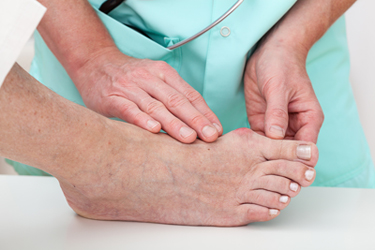
 The medical term for a bunion is referred to as hallux valgus. It appears as a bony protrusion that forms on the side of the big toe and may cause wearing shoes to be uncomfortable. The big toe can become misaligned, and may affect the remaining toes. Some of the symptoms that are associated with this condition can include pain, inflammation, and the toe may appear red. If a bunion is left untreated, arthritis may develop, which can cause deeper joint pain. Genetic factors may play a significant role in developing a bunion, in addition to wearing shoes that do not have ample room for the toes to move freely in. If you notice a bump extending from your toe, it is suggested that you consult with a podiatrist who can properly diagnose and treat bunions.
The medical term for a bunion is referred to as hallux valgus. It appears as a bony protrusion that forms on the side of the big toe and may cause wearing shoes to be uncomfortable. The big toe can become misaligned, and may affect the remaining toes. Some of the symptoms that are associated with this condition can include pain, inflammation, and the toe may appear red. If a bunion is left untreated, arthritis may develop, which can cause deeper joint pain. Genetic factors may play a significant role in developing a bunion, in addition to wearing shoes that do not have ample room for the toes to move freely in. If you notice a bump extending from your toe, it is suggested that you consult with a podiatrist who can properly diagnose and treat bunions.
If you are suffering from bunions, contact Dr. Robert Hope of Riverside Podiatry. Our doctor can provide the care you need to keep you pain-free and on your feet.
What Is a Bunion?
A bunion is formed of swollen tissue or an enlargement of boney growth, usually located at the base joint of the toe that connects to the foot. The swelling occurs due to the bones in the big toe shifting inward, which impacts the other toes of the foot. This causes the area around the base of the big toe to become inflamed and painful.
Why Do Bunions Form?
Genetics – Susceptibility to bunions are often hereditary
Stress on the feet – Poorly fitted and uncomfortable footwear that places stress on feet, such as heels, can worsen existing bunions
How Are Bunions Diagnosed?
Doctors often perform two tests – blood tests and x-rays – when trying to diagnose bunions, especially in the early stages of development. Blood tests help determine if the foot pain is being caused by something else, such as arthritis, while x-rays provide a clear picture of your bone structure to your doctor.
How Are Bunions Treated?
If you have any questions, please feel free to contact our office located in Tuscaloosa, and Fayette, AL . We offer the newest diagnostic and treatment technologies for all your foot care needs.